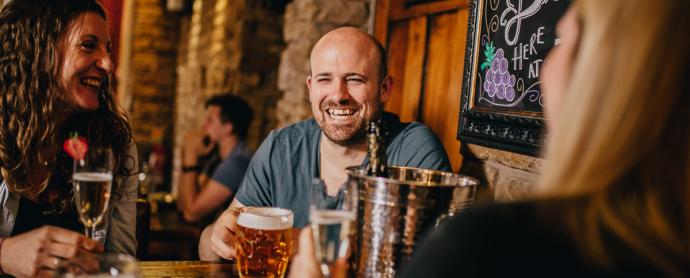Interview with Phil Simpson, Managing Director of Lancaster Brewery Holdings Ltd.
We caught up with Phil Simpson, Managing Director of Lancaster Brewery Holdings Ltd.
Before Phil’s endeavours into hospitality and entrepreneurship, which he finds constantly evolving, challenging and fitting for his personality, Phil's career background started in recruitment with a long stint with Hays PLC across a number of UK offices. But what led him on this journey to success - and why Lancaster?
Originally from York, Phil graduated with a degree from Lancaster University. Within a few months of graduating, he began with Hays in Manchester and, as his career developed, he held senior management roles in a number of UK offices. In 2002, Phil relocated back to Lancaster where his own business ventures really kicked off. But what brought him back? We’ll take a deep-dive into that soon…
Phil and his team currently operate a range of popular spots in the local Lancaster and Morecambe Bay area; including Lancaster Brewery, The Sun Hotel, The Tite & Locke, and also further afield with The Mill at Ulverston and The Duke of Edinburgh Hotel in Barrow.
Phil says that his approach to staying on top of the hospitality industry involves “constantly wanting to change and evolve, rather than ever being content with the status quo…maintaining a perpetual insecurity and never really being happy with where you are. I’m always aware that success is fleeting and, unless we improve, we’ll fade away eventually.”
Some people may think that hospitality “is a relatively simple sector” but actually “it’s always evolving, styles never sit still, the customer always wants something new. A bit like a swan, a well-run pub, restaurant or hotel seems calm and serene but under the surface there’s crazy energy and dynamism” says Phil.
We sat down with Phil to chat about his story from the beginning; from his studies in Lancaster, to opening his first business, why he chooses to live and work in Lancaster and, excitingly, what’s coming next…

So, Phil, you went to university in Lancaster - what did you study and how has it helped you in your career?
My degree is in History. I think it’s a great subject because there are lots of transferable skills that are really useful in business. Critical to being able to study History is being able to absorb lots of information and data, offer smart analysis and draw objective conclusions. I can read a report, question it, analyse it and interrogate it in a way that I possibly couldn't if I didn't have a History degree - you become a little cynical of information which I’ve found is a real positive in business. Be positive, but question everything. I've always felt that History is a fantastic degree for anyone that wants to do business.
What was your first job after university?
I spent about six months not knowing what I was going to do, and ‘94 wasn't a particularly buoyant period in British economic history. There weren’t many jobs, and very few graduate jobs at the time. I was doing a telemarketing job, when I spotted an advert for Hays in Manchester and I thought I’d go for it despite not really knowing what I was applying for.
I went to Hays and I found it was something I was quite good at. Initially, it was an intimidating working world as I was surrounded by qualified professionals often much older than me and, at first, I was by far the least academically impressive individual in the room. However I found my feet, successes started heading my way and I ended up becoming a Director of the company about five years later. I think, out of around 3000 employees at the time, I was the youngest director in the world. But maybe that’s just my memory playing tricks!
How long did you stay working in recruitment?
I remember I was accumulating a lot of shares in the late 90s and early 2000s and there was the distinct possibility that, if the stock market kept heading up (and I didn’t get fired) then I could probably retire when I was 30 years old. And then the stock market crashed. My plans of “retiring” evaporated and I needed to find another route forward.
So is this when you decided to open your first business?
In 2001, we [Phil and his business partner Matt Jackson] set up the initial company which we called C2 Investments, and that company bought The Water Witch in Lancaster, which opened in 2002. And that was the start of it all essentially. For the first five years, I was working for C2 Investments and also working for Hays…that was exhausting. In 2007, I left Hays entirely and joined this company full time.
During these early years we grew rapidly. Starting with The Water Witch in Lancaster, then The Sun Hotel, then The Palatine in Morecambe, then The Duke of Edinburgh Hotel in Barrow, and The Mill at Ulverston. During these years we also began brewing with the setting up of Lancaster Brewery. So over a period of around 10 years, we went from just having The Water Witch to being a decent sized Lancastrian business.
Big question. Why hospitality?
Business is stressful enough; you might as well do something you enjoy. I didn't enjoy recruitment. I found it a quite bleak and repetitive environment to work in. It didn’t quite suit my slightly frenetic and restless personality. From an ego and financial perspective, it was really great but it didn’t ever quite lift my soul. Many of my friends still work and thrive in the sector, I’m one of the relatively few decent operators that have left. However, as I tell everyone else in my world, I’m a big believer in finding something you enjoy and then working out a way to make a living out of it. So that’s what I did.
Hospitality is really fascinating, interesting and demanding - and fits perfectly with my personality, which is to never be too comfortable and to keep evolving.
Operating in an industry that’s evolving quickly, how do you stay on top of it? What changes have you made?
Honestly? I am never very happy with the way things are at any given moment. I constantly want to improve things, which may be stressful from my colleagues’ perspective, but it also means that we really do constantly evolve.
When we first opened The Sun Hotel nearly 20 years ago, it was, at the time, a contemporary real ale bar. There was nothing in Lancaster quite like it. We opened it with a view to making it female-friendly and not simply a “spit and sawdust” real ale pub catering almost exclusively for men. It was always designed to be a comfortable and welcoming space for all ages, creeds, cultures and backgrounds.
Now, most pubs and bars work with the same principles, but it really wasn’t the case in Lancaster twenty years ago. So now, to keep moving forwards, we have to try new improvements, new innovations and styles.
Over the last few years we’ve introduced lots of innovations to our pubs, including The Sun Hotel. We have things like call buttons on tables. We’ve noticed that people are split 50/50 on bar service, some people always prefer to go to the bar to order, others would prefer to stay seated. So we brought in these buttons to allow our guests the choice. Go to the bar if you wish but, if not, let us take the strain and bring your order to you. Our staff are kitted out with iPads and payment machines – it's efficient and customer-friendly.
Other unusual improvements we’ve employed would include our acoustic improvements. I noticed a few years ago that it was getting harder for me to hear what people were saying to me in pubs – we investigated and realised that all the hard surfaces used in modern bars and pubs create a difficult environment for sound. So, we’ve brought in a lot of acoustic baffling (you can see it clearly in The Sun Hotel) to allow people to converse easily without shouting. Very few pubs and bars are putting any thought into acoustics, and we’ve been battling this problem for the past two or three years.
From my perspective, I love the order buttons. Some people don't like them, but I do because I've always hated queuing up at a bar. So, I like the fact that when I'm at a certain stage of my evening, often mid-sermon, I press the button, the server arrives and I get a new beer. I've always felt queuing up at a bar is such a waste of time so that fixes that problem. Lancaster Brewery single handedly fixing the UK’s productivity problems!
Can you talk us through some of your venues and what people can expect when they visit?
Well, we have a few venues in the local area. We have the venue at Lancaster Brewery, The Tap & Still, which has evolved a lot in the last two or three years. We've raised the quality here from both an aesthetic and service perspective. We’re now holding a lot of weddings and private events each year. And it’s also developed in recent years from being a pure beer venue to one that also showcases our distillery. It's a big venue; we can take up to 400 people there and there aren't many places in Lancaster that can do that.
Lancaster Brewery itself has had a fantastic decade of trading. It's doing really well in a highly competitive market. We're winning local and national awards; business is great and we’re all really proud of the quality and variety of our beers. I don’t think there are many breweries in the UK who have our story. Brewing beers using their own well, their own strain of yeast, their own malt mill and such extraordinarily high production standards.
Matt Jackson and I bought The Sun Hotel in 2004 and it was our first complete overhaul of a building. Ripping out every part of the old Sun and discovering the stone walls and fireplaces (hidden behind wood chip wallpaper previously). The Sun is a brilliant all-rounder. It has great food, excellent drink options and really comfortable hotel rooms. A theme that runs throughout all our venues is that we try to create as many choices as possible for customers. Whether that’s 40 different whiskeys or 20 different vodkas or 20 different Gins. We wanted to create massive choice because we wanted people to have what they wanted, not what a pub might impose upon them. And that is still unusual. Most pubs have a tighter and less broad range of spirits, beers and wine options. I think now we've got The Sun about right. It's fantastic and I'm really proud of it.
The newest venue in the family is the Tite & Locke, which is at Lancaster train station. It’s my favourite child at the moment: a really comfortable space and serves one of my favourite Czech beers. I love the fact that the people that go to the Tite & Locke are quite different from our regular Lancaster Brewery pub customers. We have our core customers that visit all the time but then we've also got the transient individuals who are travelling for the day. It’s such an eclectic mix and I like the atmosphere it creates. The pub also looks inviting – the interior was designed over a two-and-a-half-year period and we're really proud of it. I'm quite hopeful we'll have more of these train station bars in the coming future. We're working on quite a few possibilities at the moment, we shall see…
What’s your biggest venue?
The biggest venue we have is the Duke of Edinburgh Hotel in Barrow which has 51 ensuite bedrooms plus a big bar and restaurant. Our rooms are frequently booked out for most of the week. We bought it in 2006 and it wasn't finished until 2016, so it took 10 years to complete. Yet again, we started from scratch when we first bought it.
Now, it has a really lovely bar on the ground floor and then it's got another bar plus a restaurant downstairs in the cellar. We've always found both the people and the culture in Barrow to be extremely positive and encouraging. The Barrovians have always embraced what we've been trying to do there. The Duke of Edinburgh Hotel, and its eventual success after a couple of years of expensive refurbishment, presented a critical pivot point for our business.
Most people in business will tell you that they make one decision or experience a critical moment that changes everything - something that alters the business and the progress of the company forevermore. Buying The Duke of Edinburgh was that moment. We went from being a slow developing company to one that was successful, and is still successful 20 years later.
What other venues do you have in the local area?
We have The Mill at Ulverston, which is situated in a beautiful 15th century, Grade II listed town mill. It's really beautiful - by far our prettiest bar. It's also our most complicated venue to operate because there are three separate bar areas and an extensive food offering. There's a cocktail bar in the attic, and also a terrace bar located next to the outside terrace. Both these bars generally appeal to a slightly younger demographic. And then there's the ground floor bar which has a more traditional and older feel to it. It’s the only venue we've got where we really cater for the full local demographic with our food and drink.
Again, there is a great food offering there and we're seeing the biggest growth in that venue, so it’s doing really well.
The quality of your food and drink offering is obviously important to you. How do you source your ingredients and drinks? Do you work with local suppliers?
Absolutely. The procurement of food has become much more difficult in the last two or three years because, obviously, we've had a huge increase in inflation, which has had an enormous impact on what we buy. Most of our suppliers are local. Especially from a vegetable, meat and fish perspective. We try to stick with the same people but in all honesty, because of inflation we have to be constantly looking at competitors to make sure that we're getting the best prices.
We're really hot on provenance. Not just from an ethical, economic or ecological perspective, but just from a practicality point of view. You’re better off using local milk suppliers and local ice cream suppliers. They're able to supply you even when things go wrong with their own supply chain.
We've had to be smart in the kitchens when it comes to sourcing produce. It’s putting pressure on the chefs. You've also got to be able to move with the fashions, so vegetarian food, gluten-free foods; all these things are incredibly important now and they really weren't so much 15 years ago. We are moving to a world where I suspect it's likely going to end up 50/50 between veggies and non-veggies. We’re having to adapt and evolve; Lancaster is a little ahead of our other locations but they’re all heading in much the same direction. Again, it’s another example of just how crucial it is to move and modernise, nothing stays the same for long.
It sounds like you have so many amazing things going on… but do you have anything new opening in the area that you can tell us about?
We try to do something new and exciting each year. A new business, new product or a new concept. This year it’s Lancaster Spirits Company’s new Whisky Room. In mid-2023, we began building a sizable adjoining building to the Brewery. Twelve months later, and we’ve just launched our new whisky company. This is a big new step for us because we've never invested so much money in a single product before. This is a significant seven figure investment and we've created what we call The Whiskey Room and, essentially, it’s a whiskey distillery, a cask maturation warehouse and small tasting “nook” all located in one purpose-built shed.
Whiskey is a difficult business to get into. The cost of entry is high as you need a brewery, a distillery, a warehouse, lots of technical skills and lots of patience. It's the reason why there are very few whiskey distillers in England. We've recruited a commercial manager formerly with The Lakes and Annandale whisky distilleries and also an experienced whisky distiller. We’re putting excellent people into the critical roles, allied to superb beer production capabilities and a purpose built maturation space – we have everything in place to make a product that will make Lancaster proud.
Going back to provenance and keeping things local, we already make gin and vodka. Luxury gin is a big thing in the UK. You see it everywhere and there are many different types of gins from micro distilleries. We do things a little differently to 95% of the UK’s micro distillers in that we make every single drop of the liquid in our bottle. Unlike most other distilleries we make our base spirit, the ethanol. We don’t use syrups or additives. The water comes from our well, the alcohol from distilled beers and the flavours (in the gin) are from actual junipers and botanicals. We are a genuine “grain to glass” distiller. Borehole to Bottle, for people who like their alliteration! Whether it’s our gins, vodkas or whiskies, we’re making the product slowly, precisely and properly.
We’re also opening a nano-brewery called The Little Tales Beer Company, that we’re effectively running independently of Lancaster Brewery. Lancaster Brewery produces quality traditional beers, but because of the size of our brewing kit it’s difficult to make the more modern, niche beers. So earlier this year, we bought a brand-new brewery, which is really high-tech but tiny, and shortly we’ll be able to make more unusual, experimental and edgy beers. It's got its own branding and is going to be marketed to different customers then we’ve had before. It will appeal to some people and it won’t appeal to others, and that's what we want. We wanted to create beers that challenge, dare and (to some extent) polarise.
It's really exciting, too, for our brewing staff because they've not really had a chance to make these kinds of beers before.
That all sounds really exciting. We can’t wait to try it all out! So, finally, what do you love most about the Lancaster and Morecambe Bay area?
It’s actually quite hard to do this to answer the question without falling into cliches, so I apologise for that. I went to university here. I didn't know anything about Lancaster before I came here. When I left Hays, a global business, I could’ve gone anywhere in the world. I was close at one point in the 1990s to going to Canada. I thought about going to Prague and Australia. There were lots of options.
Ultimately, I came back to Lancaster because I liked it. The question is why I stay here because, again, I could be anywhere. I think the answer is that the people are inherently pleasant, funny and welcoming. I think the university has had an incredible impact on the city in terms of diversifying it. I love the multi-cultural element to Lancaster. I love the fact you can walk down the street and you can see every type of person. I think the food and drink offering here is great and is fighting way above its weight. We've got so many top quality pubs, restaurants and bars here that you wouldn't get in a similar-sized city or town anywhere else.
From a practical perspective, I think the links to London are excellent and, for me, that's helpful. I like the fact it's really close to Manchester because I love Manchester. Manchester's been my home for a good chunk of my adult life. Lancaster’s proximity to really stunning scenery is extraordinary; to go from a fairly complicated urban world to a fairly uncomplicated rural world in 10 minutes is incredible. I think the other thing, as well, is that I'm comfortable here. It’s a busy, developing and attractive city that has all those qualities, while also being somewhere you can relax.















